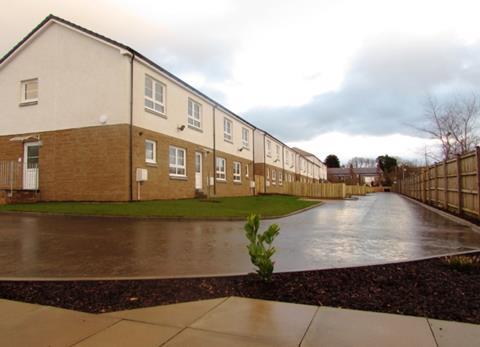Housebuilder said registration would mean it could build and hold affordable housing units
Inland Homes’ Rosewood Housing subsidiary has finally received government approval to become a “for profit” registered provider of affordable housing after a 30-month registration period.

Livingston-based Rosewood has already partnered with Clyde Housing Association on two developments in Carluke, 20 miles south-east of Glasgow, totalling 30 homes, including a five-block scheme (pictured) on the site of the old Carluke Rovers football stadium.
The AIM-listed housebuilder said registration would mean it could build and hold affordable housing units which it would then offer alongside its private homes for sale, collecting rental income and retaining the value of shared-ownership homes.
Inland Homes said: “The first property has been transferred to Rosewood which has recently been let at an affordable rent under a section 106 agreement.
“We have identified a further pipeline of new opportunities which are a mix of shared-ownership, social and discounted market rent units and we will be seeking a joint venture partner to move this business forward.”
The company said its Hugg Homes modular housing firm had 22 units in place at its Chapel Riverside site which had been let to Southampton city council and private tenants for £168,000 a year.
Another 32 units had been let to the borough of Broxbourne for three years at £319,000 a year at Cheshunt Lakeside, Hertfordshire, which would be fully income-producing within the financial year.
“This initiative has been well received by a number of local authorities and institutional landowners with whom we are exploring further opportunities to develop this business,” it added.
Announcing its half-year results, which showed revenue dip 16% to £51m in the six months to the end of December 2018 and pre-tax profit edge up 2% to £5.5m, Inland Homes said recommended planning approval for its near-2,000-unit development at Cheshunt Lakeside, Hertfordshire, had been deferred pending clarification “on a number of matters”.
It did not detail the issues, but chief executive Stephen Wicks said while it was “disappointing” not to have received the go-ahead from planners, he expected the situation “to be resolved shortly and then to receive planning permission in the coming months”.
Wicks said the firm was making progress in its transition from being a company predominantly focused on land trading to one that was delivering its medium-term annual target of 500 homes for sale and 500 homes for partnership housing.










No comments yet